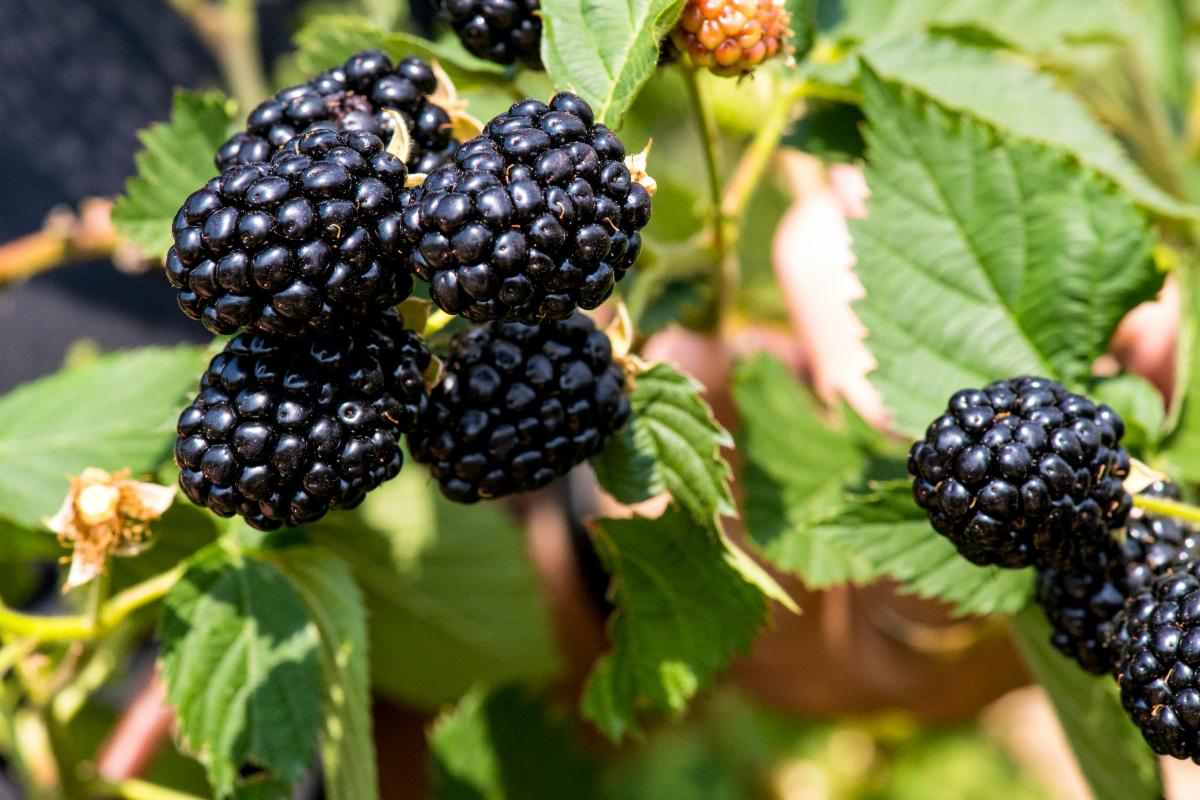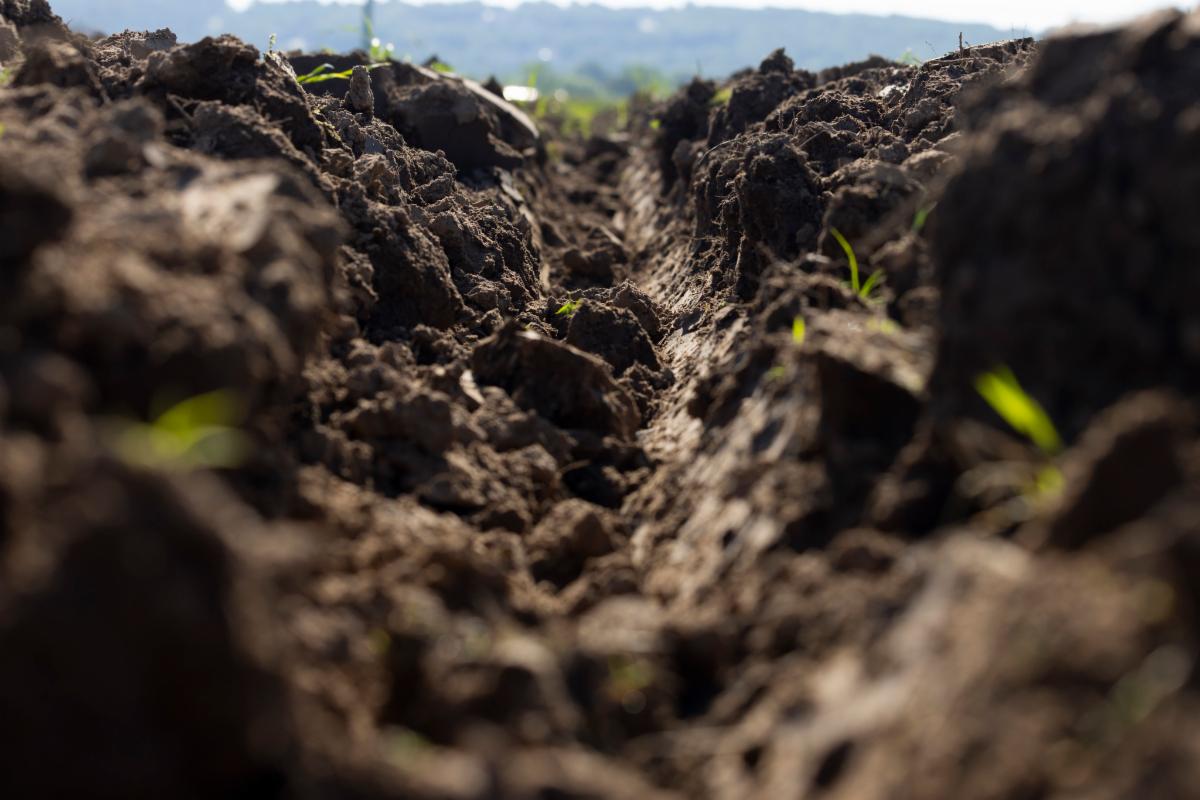May 2025 Arkansas Ag Research Report
Researchers discovered the genetic region responsible for developing thorns in blackberries. (Photo courtesy of Ellen Thompson, Hortifruit Genetics)
IN THIS ISSUE:
- Fruit breeding team discovers world’s first genetic blackberry markers for plant breeders.
- Norsworthy honored by Weed Science Society of America for herbicide resistance work.
- New research faculty aim to support Arkansas’ rice industry.
- In memoriam: Animal Science researcher Charles Maxwell had global impact
- Analysis: Solar power systems impact less than 1 percent of Arkansas’ ag land
- Study: Dog owners willing to pay more for food labeled for certain health attributes
Listen to This Newsletter 🎧
Big News
A team of researchers led by Margaret Worthington, director of the Arkansas Fruit Breeding Program, have discovered the genetic region responsible for developing thorns in blackberries.
Worthington’s team published the study in the G3: Genes | Genomes | Genetics journal, offering the world’s first diagnostic markers developed for fresh-market and processing blackberries.
Thornless blackberry varieties are the preferred option in the U.S. market. The discovery will allow plant breeders to increase genetic variation and speed up development of new thornless varieties.
Distinguished Professor Jason Norsworthy, the Elms Farming Chair of Weed Science in the crop, soil, and environmental sciences department, received the U.S. Herbicide Resistance Action Committee’s Herbicide Resistance Management Award from the Weed Science Society of America.
Herbicide-resistant weeds are among row-crop agriculture’s most problematic and expensive management issues, and Norsworthy has dedicated a nearly 30-year career to weed management.
Jason Norsworthy was honored by the Weed Science Society of America for his “outstanding contributions to key weed science initiatives and advancements.”
New Faces
Justin Chlapecka served as county extension agent before doctoral studies
Justin Chlapecka’s new role as assistant professor of agronomy comes with an office just about 35 miles from where he grew up — a return home he sees as an opportunity to give back to his community. Based at the Northeast Rice Research and Extension Center, Chlapecka will continue his close connection to farming by conducting research and offering guidance to rice and row crop farmers.
Kristiina Ala-Kokko to join agricultural economics and agribusiness department
Kristiina Ala-Kokko looks forward to zeroing in on the Arkansas rice industry come this fall as an assistant professor in the agricultural economics and agribusiness department. She is set to earn her doctorate in agricultural economics from Kansas State University this summer. Ala-Kokko is no stranger to Fayetteville though, having earned both a master’s degree in agricultural economics and a bachelor’s degree in biology from the University of Arkansas.
In Memoriam
Charles Maxwell had global reputation for research, student engagement
With a global reputation for his work in swine nutrition and management and his unparalleled ability to engage students, Charles Maxwell was a professor with a fan club.
Maxwell, professor of animal science, dedicated nearly six decades to his work. He passed away May 12, aged 83.
Research Spotlights
Study on rice lab mills shows differences in yield based on several factors
Griffiths Atungulu, a professor and agricultural engineer, recently published a study in the Cereals & Grains Association journal Cereal Chemistry with members of his rice processing research team that offers information to help optimize lab methods for rice milling.
Samuel Olaoni, a doctoral research student in the food science department, was lead author of the study under Atungulu’s advisement. The study showed there can be significant differences in milling yield and whiteness index between lab mills based on the moisture content of the rice and the cultivar of rice that was milled.
Soil fertility research publication tracks results of soil testing samples from across the state
Each year, the Arkansas Agricultural Experiment Station publishes the Wayne E. Sabbe Arkansas Soil Fertility Studies. The latest edition includes investigations into the effects of fertilization on row crops, blackberries, forage and soil, plant tissue nutrient testing and perceptions of stakeholders when it comes to the state’s public soil testing program.
Solar power system installations impact less than 1 percent of Arkansas’ ag land
Solar energy production is increasingly being used to meet both energy needs and zero net emissions goals within the United States. Arkansas is following this trend with several utility-scale solar energy production systems built in 2023 and 2024, with more scheduled to come online in the following years.
“With the Arkansas economy more reliant on agriculture compared to the nation and surrounding states, diversion of agricultural land to other uses draws producer and consumer interest,” said Mike Popp, Harold F. Ohlendorf Professor of agricultural economics and agribusiness and co-author of a recently released report titled “Agricultural Land Footprint of Solar Photovoltaic Installations in Arkansas.”
Large-scale solar power arrays occupy about 0.2 percent of the 13.7 million acres of agricultural land in Arkansas, according to the report.
Dog owners willing to pay more for food labeled for certain health attributes
As pets become more and more part of the family and owners prove more willing to pay a premium for foods labeled to address pet health, a new study explores which pet health concerns bring the highest prices.
The study, published in the Journal of Agricultural and Applied Economics, was co-authored by Andrew Anderson, an assistant professor in the agricultural economics and agribusiness department.
“Pets have gone from being in the doghouse to being a member of the family, so when it comes to the diet of the pet, that’s a big way in which that bond manifests,” Anderson said.
Watch
Trenton Roberts – Optimizing Soil Fertility
Trent Roberts may not develop new crop varieties, but he helps them thrive. Roberts, a professor of soil fertility and soil testing, aims to increase crop yields, improve fertilizer use efficiency, and boost farm profitability and resilience. For Roberts, it all goes back to serving Arkansas farmers. “The research that we’re able to do in Arkansas, I think, is cutting edge,” he said.
Hot off the Press
International Rice Baseline Report, 2024-2034
The International Rice Baseline Report, prepared by researchers in the agricultural economics and agribusiness department, provides a 10-year outlook on global rice production and consumption.
This year’s edition projects that global rice consumption will exceed production in the coming decade, and projected increases in production will be due almost exclusively to productivity gains. This report plays a behind-the-scenes role in the development of ag policy.
Upcoming Events
- June 9 – Getting to the Root of Crop Health: Understanding Water Quality Risks and Treatment Designs
- June 10 – Blackberry Field Day
- June 12 – Farmers for Tomorrow with the Center for Arkansas Farms & Food
- June 16 – Getting to the Root of Crop Health: Customizing Your Recirculated Hydroponic Solutions
- July 21 – Getting to the Root of Crop Health: Cold Plasma and Ozone for Water Sanitation
- July 29-30 – Soybean College at the Jackson County Extension Center
- July 31 – Northeast Rice Research and Extension Center Field Day
- August 6 – Turfgrass Field Day
- August 7 – Getting to the Root of Crop Health: Stratified Substrates for Nursery and Greenhouse Crops
- August 7 – Rice Field Day at the Rice Research and Extension Center in Stuttgart
- August 14 – Pine Tree Research Station Field Day














